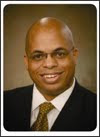The Judeo-Christian teachings of my parents had a profound effect on my management philosophy. My parents required my two sisters and I to attend church every Sunday where the Golden Rule to “love your neighbors as yourself” was repeatedly cited in songs and sermons (Leviticus 19:34 and Matthew 7:12, New King James Version). This value was also reinforced consistently at home, which helped infuse a deep, abiding respect for people into my character.
Growing up in poverty-stricken East St. Louis taught me the value of hard work. I was well aware of the accomplishments of famous natives such as Miles Davis, Katherine Dunham and Jackie Joyner-Kersee. Their success was attributed to hard work and the ability to execute a life plan with the help of the community. The cultural norm for responsible youth citizenship was that if you were not active in fine arts or sports, social gravity would surely pull you down.
For me, work ethic and follow-through were reinforced in the band room nearly every school day from elementary school through undergraduate studies. I eventually excelled at musicology in high school, earning all-state honors, first-place in the statewide composition contest and several collegiate scholarships.
Teamwork skills were developed through the art of listening to ensure that my unique contribution to the overall sound was appropriate. As section leader, I was held accountable for developing other trombonist on my team. As a jazz improviser, I became very comfortable with the ambiguity and chaos that comes from interacting with other free spirits. Finally, as a composer and arranger, vision was the genesis of every good work of art.
Excerpt from The Personal Management Philosophy of Roderick Nunn
Submitted in Spring 2010 for UMUC Doctor of Management in Community College Policy and Administration
Saturday, May 22, 2010
Sunday, April 11, 2010
Are You Looking Beyond the Veil of the Recession?
As community colleges showcase their adaptive, resilient spirit in response to the current economic crisis, its leaders must be mindful of the projected deficits in human capital that existed before the downturn. The interplay between America’s declining international share of science, technology, engineering and math (STEM) graduates, poor student achievement by a growing minority population, and the age of the existing workforce continue to form a perfect storm requiring leaders to take a forward-looking approach to helping America secure a sustainable economic recovery.
At the dawn of the 21st Century, one had to be hiding under a rock to miss the well-researched refrains of many thought leaders across the nation. How will America increase is production of STEM graduates to keep pace with the rest of the world? How will America address the large gaps in literacy and numeracy for minorities – the fastest growing college population? How will America replace large numbers of baby boomers set to retire in the coming years? Many of these issues were profiled in 2008 Compete 2.0 publication, Thrive: The Skills Imperative.
Unfortunately, the current fixation on the Great Recession has caused leaders to take a hear-and-now approach driven by budget cuts and worker retraining investments. Thanks to the St. Louis Post-Dispatch and its recent three-part series, Can St. Louis Compete, those of us in St. Louis were reminded of important workforce issues deemed critical before the recession: the age of the existing workforce; the immigration debate; the need to grow and retain our own talent, etc. Are these still issues still important to our economic future? Are you looking beyond the veil of the recession?
At the dawn of the 21st Century, one had to be hiding under a rock to miss the well-researched refrains of many thought leaders across the nation. How will America increase is production of STEM graduates to keep pace with the rest of the world? How will America address the large gaps in literacy and numeracy for minorities – the fastest growing college population? How will America replace large numbers of baby boomers set to retire in the coming years? Many of these issues were profiled in 2008 Compete 2.0 publication, Thrive: The Skills Imperative.
Unfortunately, the current fixation on the Great Recession has caused leaders to take a hear-and-now approach driven by budget cuts and worker retraining investments. Thanks to the St. Louis Post-Dispatch and its recent three-part series, Can St. Louis Compete, those of us in St. Louis were reminded of important workforce issues deemed critical before the recession: the age of the existing workforce; the immigration debate; the need to grow and retain our own talent, etc. Are these still issues still important to our economic future? Are you looking beyond the veil of the recession?
Subscribe to:
Posts (Atom)





